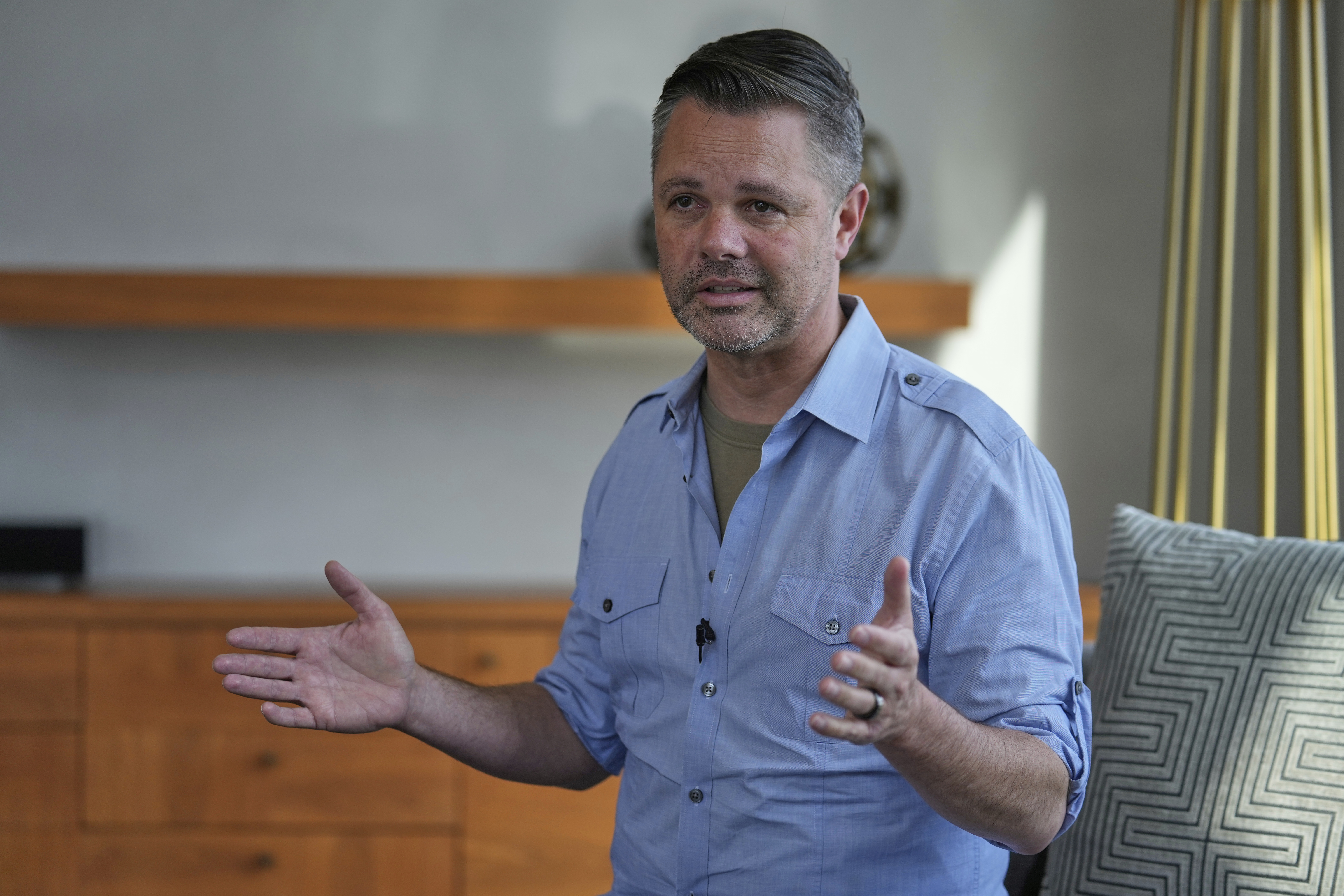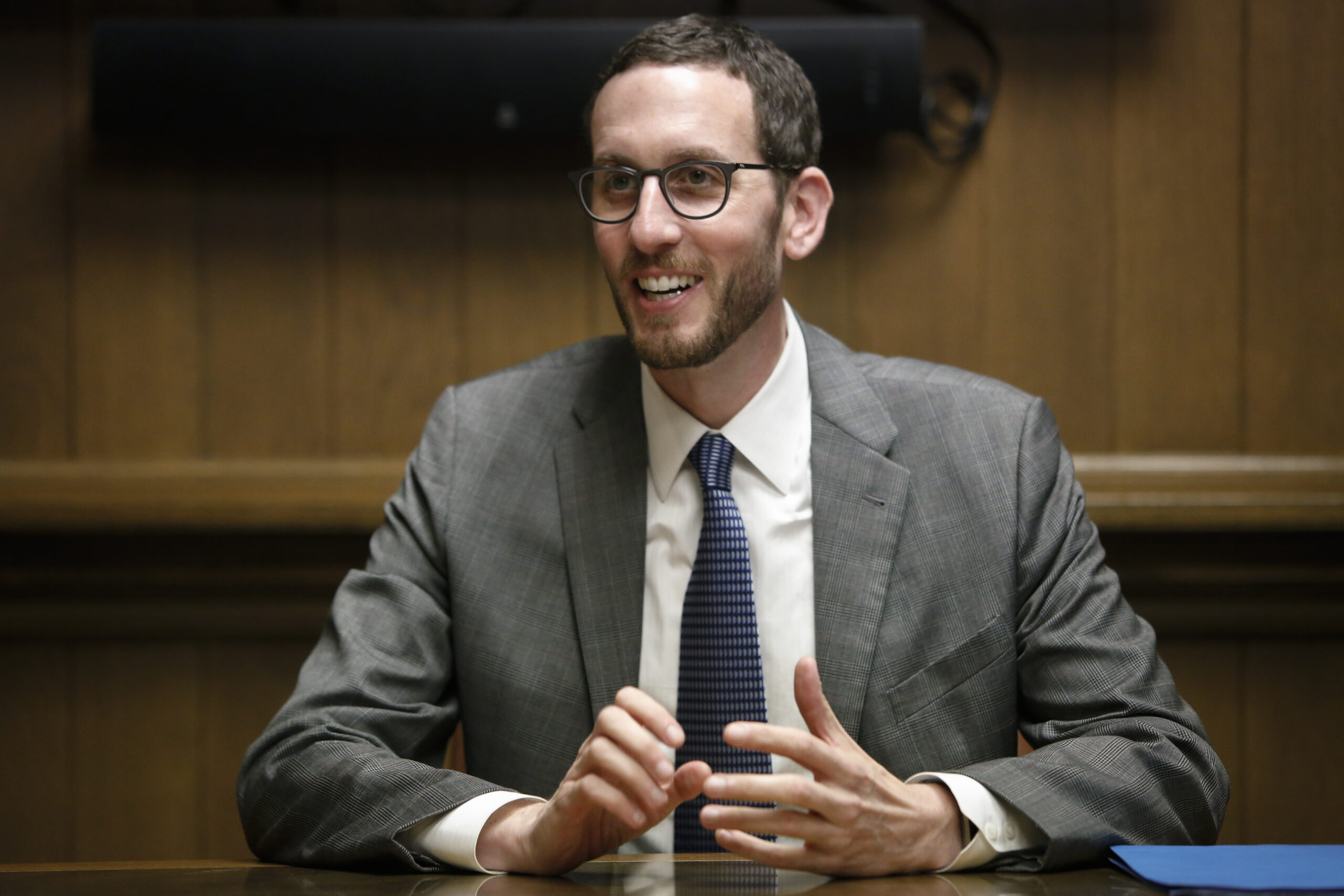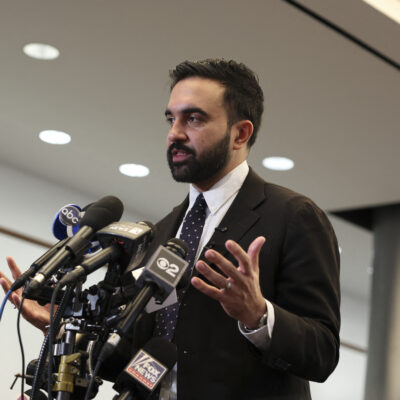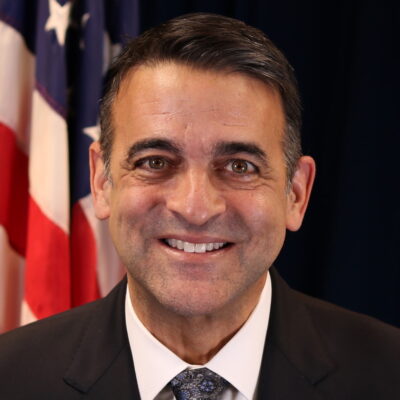
AP Photo/Altaf Qadri
Rep. Zach Nunn pushes to expand U.S.-Israel cooperation, technology partnerships
In an interview with JI, Nunn says the U.S.-Israel military relationship is crucial to pushing the boundaries of defensive technological development, keeping Americans safe and staying ahead of global adversaries
For Rep. Zach Nunn (R-IA), the U.S.-Israel military relationship is crucial to pushing the boundaries of defensive technological development, keeping Americans safe, staying ahead of global adversaries and even providing advancements in sectors far removed from the battlefield.
Nunn is a rising national security voice on Capitol Hill, chairing the national security task force of the Republican Study Committee, is an Air Force veteran with experience in the Middle East and is also a longtime former intelligence officer. He hails from a competitive district in southwest Iowa, which includes much of Des Moines and stretches to the state’s southern border.
“We know that not only is Israel our best military partner for the region, it is the best stabilizing force,” Nunn, who led a pair of successful amendments in last week’s National Defense Authorization Act markup on the House floor aimed at improving U.S.-Israel military cooperation, told Jewish Insider in a recent interview. “Not only is Israel a force for good in the region, it’s one of our best innovative partners out here, and national defense begins with a tech and human capability that’s able to execute on it. And that really is funded through democracies that allow this type of innovation to take place.”
One of Nunn’s amendments, cosponsored by Reps. Josh Gottheimer (D-NJ) and Don Davis (D-NC), would establish a Defense Innovation Unit field office in Israel.
The DIU, which has offices throughout the U.S. and is headquartered in Silicon Valley, is a relatively new Pentagon body aimed at allowing the military to move more quickly to adopt emerging commercial and dual-use technologies — a “fast-track for a largely challenged defense apparatus … to onboard new technologies more quickly,” Nunn explained.
The tech sector, he said, starts on the West Coast, in Silicon Valley, and extends to “the East Coast, which in my mind is Tel Aviv.”
“I think that we have seen some of the best innovations coming out of Israel. Part of it is need, part of it is just the innovative spirit that Israel has brought to the fight on this,” he continued. “How do we onboard this so that the best technologies — and, candidly, the best tactics, techniques and procedures that Israel is literally field testing right now — can be replicated so that we help defend the men and women in uniform?”
He said that such efforts will save U.S. taxpayer money, help the U.S. keep ahead of its key adversary in Beijing and even provide advances in civilian technology. Precision-guidance weapon capabilities that Israel is developing can also be applied in precision agriculture techniques in Iowa, Nunn said.
Nunn’s other amendment, cosponsored by Davis, would require the Pentagon to review and report to Congress on progress made toward an integrated air and missile defense infrastructure in the Middle East, strategies and options for expanding those efforts and lessons learned from recent attacks throughout the region. Both amendments were incorporated into larger packages of amendments and passed by voice votes.
Of all the U.S.’ global allies, Nunn said, Israel is providing the most practical proving ground for new defensive technologies.
“It’s one thing to be able to do drills, to do innovation, to come up with new technologies. It’s another thing to be able to have to deploy them in the field … find out how they work and then be able to change your … tactics and employment in real time,” Nunn said. “That makes us much safer than just having the ideal weapons system on the shelf, to know how it’s going to work in battle and how our men and women in uniform can be best protected by it.”
Nunn noted that he was tied for the record of most amendments, nine in total, secured in the 2026 NDAA on the House floor.
Asked more broadly about the push from some, on both sides of the aisle, for the U.S. to reduce its focus and posture abroad, Nunn argued that relationships like the one with Israel pay dividends for the U.S.
“Peace through strength matters, and a peaceful Middle East is a lower cost to the American taxpayer,” Nunn said. “At the same time, it’s Israel who took out Iran’s missile defense systems. It’s Israel who’s provided the intelligence that has allowed us to not only save money, but save lives here on the home front. It’s Israel and the Mossad and IDF, who have taken out Iranian proxy groups, whether they be Houthi rebels, Hamas or Hezbollah, that have sent death squads after great leaders here in the United States.”
Efforts like the amendments he led, Nunn said, create American jobs, save the U.S. money, create technologies that can be used in both military and civilian applications and reduce the burden on the U.S.’ own forces.
“The United States is getting the best possible return when we partner with allies,” Nunn said, a position on which he said President Donald Trump and most members of Congress should be able to agree.
“Peace through strength matters, and a peaceful Middle East is a lower cost to the American taxpayer,” Nunn said. “At the same time, it’s Israel who took out Iran’s missile defense systems. It’s Israel who’s provided the intelligence that has allowed us to not only save money, but save lives here on the home front. It’s Israel and the Mossad and IDF, who have taken out Iranian proxy groups, whether they be Houthi rebels, Hamas or Hezbollah, that have sent death squads after great leaders here in the United States.”
Nunn noted that he was in the region, visiting Saudi Arabia, Bahrain and the United Arab Emirates on the eve of the U.S. strikes on Iran’s nuclear program in June.
He said that the U.S. strikes would not have seen the same level of success without Israel “doing all of the prep work on the front end,” and that the U.S. bombings sent a strong message to Iran and other adversaries.
“Clearly, President Trump is in a different league of presidents when it comes to negotiation,” Nunn said. “He’ll offer you peace. If you say no to it, he’s prepared to make sure that you can no longer be a threat to the world. I think that that sends a very important message to the next iteration of negotiations here with Iran. … The president has emboldened our allies, but also sent a very clear message to Iran that this is where it ends.”
“That’s a message that saves lives, saves taxpayer dollars and advances us when we look at emerging threats, whether they be in Moscow, Pyongyang and certainly Beijing,” Nunn continued. “The amount of investment that we have to make on the front end is much lower because we have those partnerships that amplify our ability, than if we were to have to do this all on our own, whether it’s domestically or internationally.”
Asked about the path forward with Iran, Nunn said that Trump’s approach to the conflict is distinctly different than that of past presidents. He said he was told by an Arab leader the day before the American strike on the Fordow nuclear facility that the Iranians had told that Arab leader that they believed they would secure further concessions from the U.S. by dragging out talks.
“Clearly, President Trump is in a different league of presidents when it comes to negotiation,” Nunn said. “He’ll offer you peace. If you say no to it, he’s prepared to make sure that you can no longer be a threat to the world. I think that that sends a very important message to the next iteration of negotiations here with Iran. … The president has emboldened our allies, but also sent a very clear message to Iran that this is where it ends.”
Nunn said that Iran now “has the opportunity” to cease its malign activities — funding for terrorism, weapons sales and development of nuclear and conventional weapons — and turn toward peace and collaboration with Israel and the United States.
The Iowan is also leading a bill to codify and build upon the maximum-pressure sanctions on Iran and ensure the enforcement of U.S. oil sanctions, describing it as a companion to the administration’s military strikes. He said the broad Republican support for the effort shows the conservative support for holding Iran accountable, for backing Israel and for providing relief to the Iranian people.
Nunn said he’s personally flown missions out of the Al-Udeid airbase in Qatar — the largest U.S. airbase in the Middle East — and that he agrees with the stance Trump took on the Israeli strike on Hamas officials in that country.
“In many ways there’s a shared concern here that Iran is the real radical, unhinged aggressor in the region, and there’s greater security by standing up not to a fellow Islamic state, but a state that is truly an autocrat and intends to threaten the rest of the world,” Nunn said.
“Qatar has been a great ally to us for decades now,” Nunn said. “They are a recognized partner in this. At the same time, there are bad actors everywhere. And as the president highlighted, I fully endorse — when Hamas is operating knowingly or unknowingly in a region — we’ve got to be able to decapitate that threat so it can’t reconstitute.”
He said he wants to see the U.S., Israel and the U.S.’ Arab partners pull closer together to counter threats from Hamas and other adversaries through the Abraham Accords and similar mechanisms.
“In an ideal situation, we never would have had these strikes to take place in the first place. We would have been able to share the intelligence and we would have eliminated this Hamas node working together,” Nunn said. “That’s the vision where I want to get to.”
The Abraham Accords, Nunn said, are helping to create a pathway for the region that Arab leaders remain excited about, based on recent visits to the region. He added that while many Arab countries’ populations remain hostile toward Israel, the tenor of anti-Israel public discourse has improved.
“In many ways there’s a shared concern here that Iran is the real radical, unhinged aggressor in the region, and there’s greater security by standing up not to a fellow Islamic state, but a state that is truly an autocrat and intends to threaten the rest of the world,” Nunn said.






